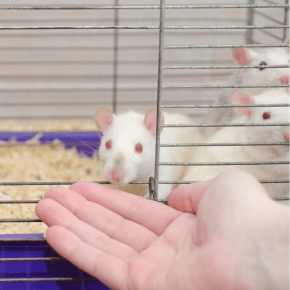Vets in Weybridge share the health risks of parasites in small pets

While pet rodents like mice, rats, and hamsters may be small in size, they can still be susceptible to internal parasites like tapeworms and pinworms. Our vets in Weybridge want owners of small furry pets to be aware of these potential health threats and be able to spot the signs of worms at home.
Ask us about small pet parasite treatmentsBefore we dive in, did you know that April is National Pet Month? Share a photo or video of your tiny companion on our Facebook page and let's celebrate the joy of pet ownership together!
Understanding tapeworms and pinworms
- Tapeworms are common in rodents and are typically transmitted through the ingestion of infected fleas or lice. Once ingested, tapeworm larvae develop into adult worms in the rodent's intestines, where they can grow and produce eggs, perpetuating the cycle of infection.
- Pinworms are small, thread-like parasites that can also infect the intestines of rodents, often through the ingestion of contaminated food or bedding.
Five signs of tapeworm and pinworm infestations:
Vet Simon Felger at our Weybridge vet practiice shares that detecting tapeworms and pinworms in pet mice, rats, and hamsters can be challenging, as these parasites may not always produce noticeable symptoms. However, there are some signs that may indicate a worm infestation in your furry friend:
- Weight loss despite having a normal appetite.
- Visible worm segments (in the case of tapeworms) that look like small, rice-like pieces in your pet's faeces or around their bottom area.
- Itching and irritation around the bottom area, leading to excessive grooming or scratching.
- Appearing lethargic or less active than usual.
- A rough, dull coat could indicate an underlying health issue, including a worm infestation.
Preventing and treating worm infestations
Simon advises pet owners that preventing worm infestations in pet rodents begins with good hygiene and sanitation practices. By keeping your pet's cage clean, and providing fresh bedding and food regularly, you can minimise the risk of exposure to parasites. Additionally, Simon recommends that you should avoid feeding your pet rodents wild-caught insects or uncooked grains, as these may carry tapeworm eggs or pinworm larvae.
If you suspect your pet mouse, rat, or hamster may have tapeworms or pinworms, get in touch with our Weybridge team promptly. Simon or another of our vets can perform a thorough examination and recommend appropriate treatment options, which may include deworming medications or other interventions to help eliminate the parasites. Additionally, our vets can offer guidance on preventive measures to reduce the risk of future infestations in your small furry pets.
Remember, early detection and intervention are key to managing worm infestations in pet rodents. By staying vigilant and seeking veterinary care at the first sign of trouble, you can help protect your tiny companions from the harmful effects of internal parasites.
Ask us about small pet parasite treatmentsBefore you go, pop over to our Facebook page and share a photo or video of your small furry pets to celebreate National Pet Month!



